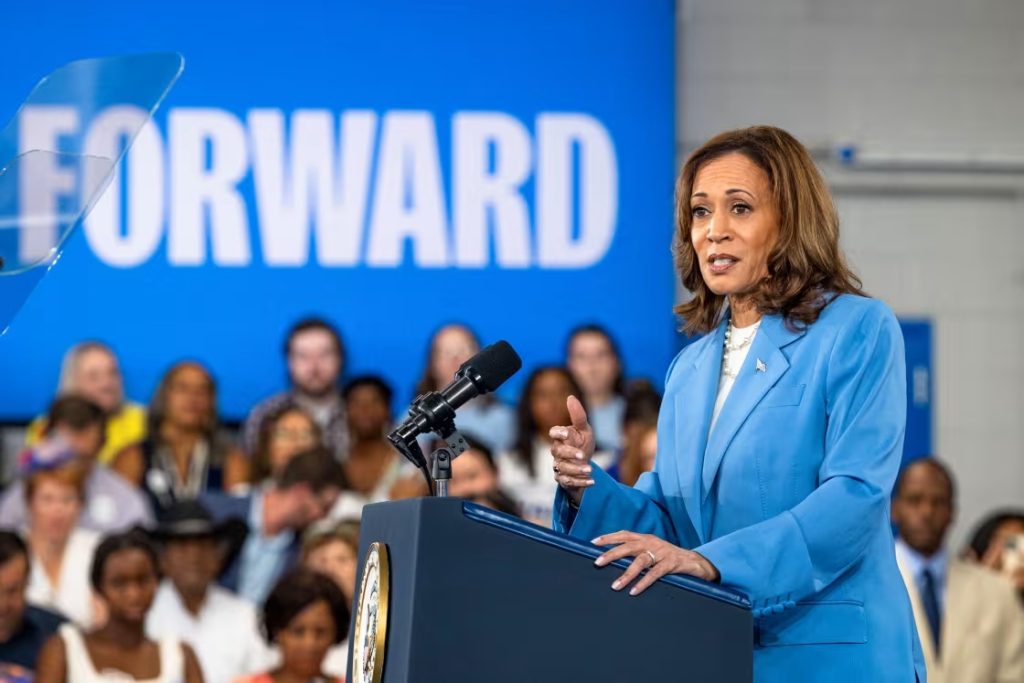During a campaign rally on Friday in North Carolina, Vice President Kamala Harris emphasized her commitment to addressing the high cost of living if she is elected president. She outlined her plans to reduce food and housing costs, lower prescription drug prices, and enhance the child tax credit.
Harris acknowledged the progress made by the Biden administration in improving the economic situation inherited from former President Donald Trump, but she admitted that this progress has yet to be felt by many Americans in their daily lives. “Despite the strides we’ve made, costs remain high, and for many, it feels nearly impossible to get ahead regardless of how hard they work,” she said. “As president, I will prioritize tackling the high costs that impact Americans most, like food prices. We saw prices rise during the pandemic due to supply chain disruptions, but even with improvements in supply chains, prices remain excessively high.”
Prior to her speech, Harris’s campaign unveiled her proposals. She plans to collaborate with Congress to enforce a federal ban on price gouging for food and groceries. This initiative aims to establish regulations that prevent large corporations from exploiting consumers to maximize their profits. Additionally, she seeks to grant the Federal Trade Commission and state prosecutors enhanced authority to impose stringent penalties on companies that violate these rules.

The Trump campaign criticized this approach, describing it as “communist” and derisively referring to Harris as “Comrade Kamala.” They argued that allowing federal bureaucrats to dictate grocery prices could disrupt market dynamics and ultimately lead to higher costs for consumers. “It’s hard to overstate how disastrous it is to let Washington dictate the price of groceries, disrupting the free market’s supply-and-demand balance and resulting in increased prices for everyone,” an unnamed spokesperson from the Trump campaign stated.
In her address in Raleigh, Harris acknowledged that while most businesses contribute positively to the economy by creating jobs and adhering to regulations, some do not, and action is necessary against such malpractices. She also introduced her plans to offer tax incentives for homebuilders who construct affordable starter homes and to provide a $25,000 subsidy for first-time homebuyers. She promised to eliminate “unnecessary bureaucracy and regulatory red tape,” foster “innovative technologies while safeguarding consumers,” and ensure a “stable business environment with clear and consistent rules.”
Harris also proposed expanding the child tax credit to offer $6,000 in tax relief during the first year of a child’s life. She intends to extend Medicare’s $35-per-month insulin cap to all insulin users and broaden the Medicare drug price negotiation program. These initiatives face opposition from Congressional Republicans. In 2022, Senate Republicans blocked a proposal to cap insulin costs on the private market, and earlier this month, they thwarted a smaller child tax credit bill than the one Harris is advocating.
Harris took the opportunity to criticize Trump’s proposal to impose broad tariffs on imported goods. “Trump’s plan is essentially a national sales tax on everyday products and basic necessities from other countries, which would lead to increased prices for Americans,” she said. “This Trump tax would affect gas, food, clothing, and over-the-counter medications.” Trump has defended his tariffs as a strategy to confront foreign trade practices.
The Vice President also condemned Trump’s efforts to repeal the Affordable Care Act, which elicited chants of “We’re not going back!” from the crowd—a refrain she has embraced as a campaign rallying cry against Trump’s potential return to power.
Harris connected Trump to the conservative Project 2025 agenda and criticized his plans to extend tax cuts for the wealthy. “Trump’s plan involves massive tax cuts for billionaires and a trillion-dollar reduction in corporate taxes, even as these corporations record unprecedented profits,” she said.
In contrast, Harris has adopted President Joe Biden’s promise not to raise taxes on individuals earning less than $400,000. This suggests that she may extend some of the Trump-era tax cuts for lower-income earners when they expire at the end of 2025.
Looking ahead, Harris promised to provide more detailed information on her plans to create an opportunity-driven economy. She framed the 2024 election as a choice between two divergent visions for the country: “One focused on the future and the other mired in the past,” she concluded.

